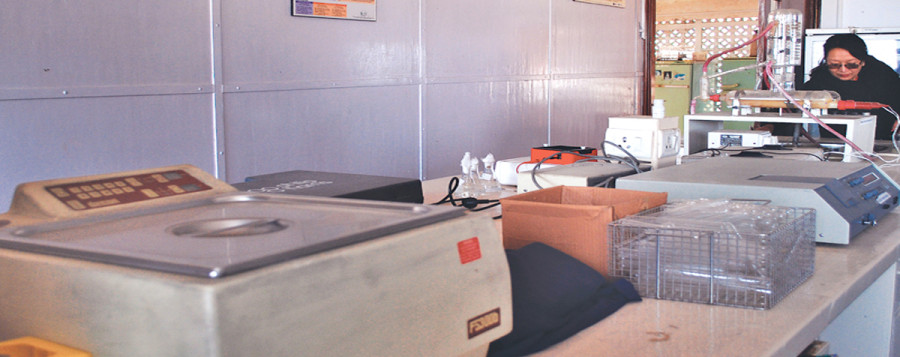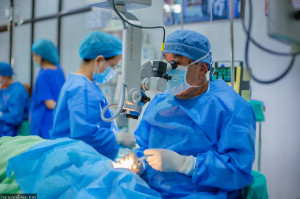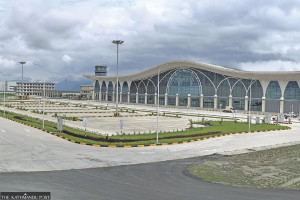Miscellaneous
Futures on hold
Sitting behind an autoclaving machine, a pot in which water boils at a higher temperature than its normal boiling point, Suman Maharjan, 26, vents his frustration. It has been six months since he completed his fourth semester examinations, and had the sterilisation equipment needed to conduct his Master’s thesis been readily available, he would have been done with his studies. His thesis aims to find the effect antibiotics have on bacteria, but with the labs at the Central Department of Microbiology at Tribhuvan Universty running low on supplies, the progress has been laboured.
Binod Ghimire
Sitting behind an autoclaving machine, a pot in which water boils at a higher temperature than its normal boiling point, Suman Maharjan, 26, vents his frustration. It has been six months since he completed his fourth semester examinations, and had the sterilisation equipment needed to conduct his Master’s thesis been readily available, he would have been done with his studies. His thesis aims to find the effect antibiotics have on bacteria, but with the labs at the Central Department of Microbiology at Tribhuvan Universty running low on supplies, the progress has been laboured.
He had placed an order for the antibiotics and other chemicals needed for his thesis in the second week of September from India. But as his luck would have it, the unofficial blockade, from the third week of the month, halted most imports. It took him more than three months to get the supplies, and when they finally did come in, the campus lab ran out of LPG. Another month was wasted before arrangements were made and he could commence the practical thesis.
“It was a struggle. The months lost waiting to begin the study have been very difficult,” Maharjan laments. “You can find dozens of such painful stories here in Kirtipur. There are scores of students who lost a lot of time because of the earthquakes and the blockade,” he adds, “Motivation, too, is running low.”
Now with all the pieces in place, he hopes to present a final report of the thesis in a couple months. By then, his Master’s degree will have been delayed by almost a year.
In late 2013, TU adopted the semester system—applicable to all central departments with post-graduate degrees—with four six-months semester making it possible for students to complete a course in two years. But with natural and political disasters that have followed, the completion period has been closer to three years, creating problems for hundreds of students like Maharjan who would have, otherwise, already joined the workforce.
All academic institutions were closed for over a month following the devastating April 25 earthquake and its strong aftershocks. Many campuses across the country suffered infrastructural damages. Yet, just as repairs, or relocation, were completed and classes commenced once more, the unofficial blockade slowed down the momentum. The shortage of fuel has meant that students, and oftentimes even the teachers, have not been able to be regularly attend class. Practical and lab courses have been halted due to the lack of chemicals, the power-outages and the shortage of fuel to operate generators.
As an applied science, the Masters curriculum for microbiology mandates three periods of theory and four periods of practical every day. The Microbiology Department at TU, for the past three months, however, has all but halted a majority of the practical periods. According to Professor Anjana Singh, the Head of Department, given the lack of chemicals and reliable power supply, it is not possible to operate the labs. She says the department have asked instructors to complete theoretical classes for now and conduct practicals once supplies have normalised.
Nepal solely depends on Indian imports for a majority of the chemicals and equipments required in labs, but the blockade has meant that suppliers have not been able to make deliveries on time. For instance, points out Singh, her department had procured a Spectro-photo meter from a bidder in September after the one at the department became defunct. The supplier has not been able to deliver the instrument as it is waiting for clearance at the Indian border. “We have extended the deadline three times and are still unsure when it will get delivered,” she says. Besides chemicals and equipment, all the departments under the Institute of Science and Technology (IoST) need to operate fridges, hot air ovens and autoclave machines, among others, which need power to operate.
The 12-hour power outages have hit these departments hard, and the unavailability of fuel to run generators have compounded the issue. Chirika Shova Tamrakar, Dean of IoST, says all departments at the university are facing similar problems. Over 5,000 students study in over a dozen departments under IoST, which includes zoology, botany, biotechnology and environmental science, among others. Tamrakar says that she has personally requested the Ministry of Energy and the Ministry of Supplies to install separate feeders to the university for the uninterrupted supply of electricity and LPG and other petroleum products. “Otherwise the entire academic session will be delayed,” she says.
According to her, apart from academics, the present blockade has hampered administrative work as well. There have been problems in printing question papers due to the lack of power and adequate printing papers. Daily administrative tasks halt for long hours during the day with the computers down during load-shedding hours. “It is a bad situation. The teaching and learning process cannot be normal (much less optimal) when both teachers and students are struggling to manage their daily life,” Tamrakar adds.
Nepal’s academic sector suffered unprecedented setbacks in 2015. And with no clear signs of resolution in sight, 2016 looks set to follow suit.




 11.12°C Kathmandu
11.12°C Kathmandu










